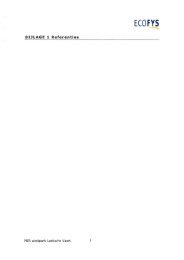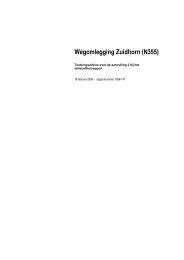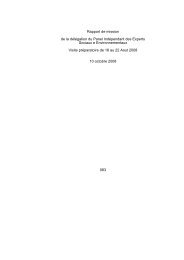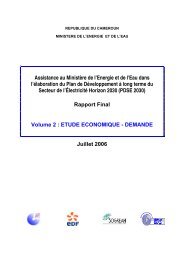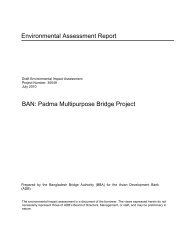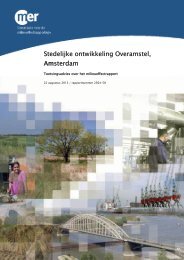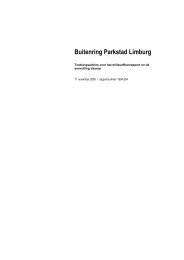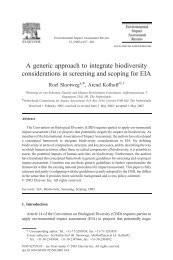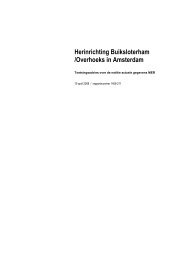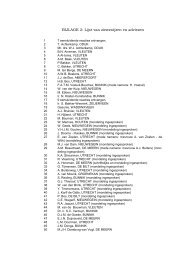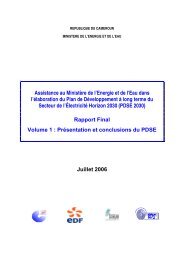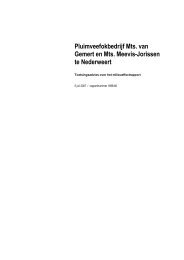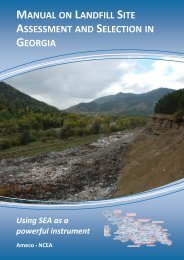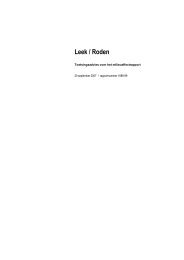Scoping Advice for the Dutch IWRM Support Programme Rwanda
Scoping Advice for the Dutch IWRM Support Programme Rwanda
Scoping Advice for the Dutch IWRM Support Programme Rwanda
You also want an ePaper? Increase the reach of your titles
YUMPU automatically turns print PDFs into web optimized ePapers that Google loves.
Roles within <strong>IWRM</strong>Working in pairs, <strong>the</strong> participants discussed each o<strong>the</strong>r’s roles within <strong>IWRM</strong>. It became clear thatall participants have a <strong>for</strong>mal role to play within <strong>IWRM</strong>, which makes good cooperation essential<strong>for</strong> <strong>the</strong> implementation of <strong>IWRM</strong>. For example: data collection takes place at various organisations,while data sharing is at present not organised.Day 2 – Ways <strong>for</strong>wardDuring <strong>the</strong> second day, 3 parallel working groups took place based on <strong>the</strong> 3 main issues identifiedby <strong>the</strong> EKN <strong>for</strong> <strong>the</strong>ir support programme: monitoring, institutional/capacity development, andcatchment planning. Each group was led by a representative of <strong>the</strong> RWRD and one of <strong>the</strong> NCEA.Participants were able to chose <strong>the</strong>mselves which workshop to join.Working group 1 – MonitoringVarious discussions within this group lead to <strong>the</strong> following main conclusions:- Monitoring tools are partly available but in different institutions- The tools are not enough (not enough models, manpower, limited parameters egsediment)- There is no central monitoring- There is a water <strong>the</strong>matic working group (it would be good to en<strong>for</strong>ce this group, elaborate/extendthis group and define technical issues to be solved)- We share in<strong>for</strong>mation with water department (SEWA, EWASA, MINAGRI…ect..)- What is needed? Models (surface, ground and flood), manpower, implementation, capacitybuildingWorking group 2 – Institutional frameworkDuring <strong>the</strong> first day it was stated that while <strong>Rwanda</strong> is making progress in developing <strong>the</strong>institutional framework <strong>for</strong> <strong>IWRM</strong>, it is not yet operational. This became <strong>the</strong> focus of discussions inthis group: what is <strong>the</strong> current situation, what would be required?At central level:- staffing is becoming available but needs practical experience;- staff needs more tools and practical skills – learning by doing (knowledge transfer);- not all actors are aware of role and responsibilities (central & decentralised level) –statutory versus community needs;- in<strong>for</strong>mation packaging <strong>for</strong> (inter)national actors.At decentralised level:- capacity and staffing issues;- define composition of management structure based on catchment characteristics.The group discussed fur<strong>the</strong>rmore:- how to marry <strong>the</strong> proposed management structure (following catchment boundaries) with<strong>the</strong> water law (administrative/district boundaries)?- to ga<strong>the</strong>r in<strong>for</strong>mation on not directly water related issues and combine <strong>the</strong>se(de<strong>for</strong>estation, erosion, etc.);- existing and upcoming monitoring framework;- transboundary issues, <strong>for</strong> now: focus on in<strong>for</strong>mation ra<strong>the</strong>r <strong>the</strong>n process.Appendix 6 page -2-



